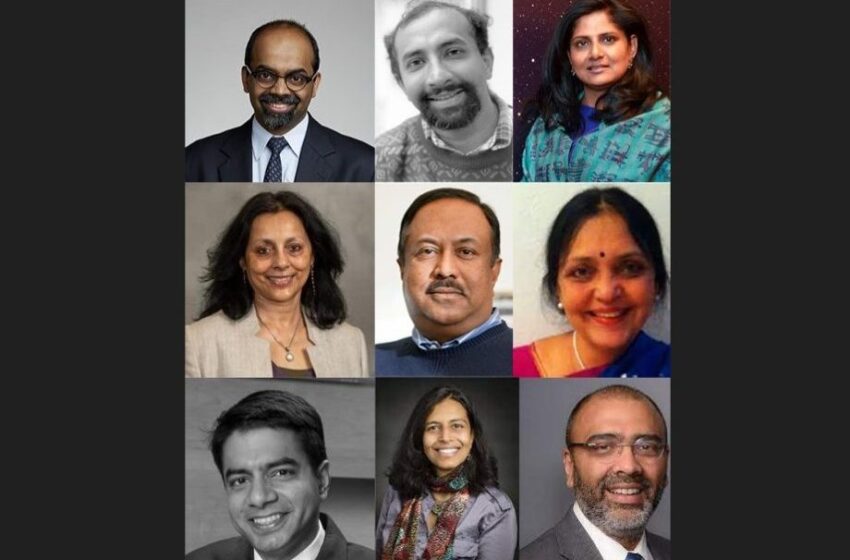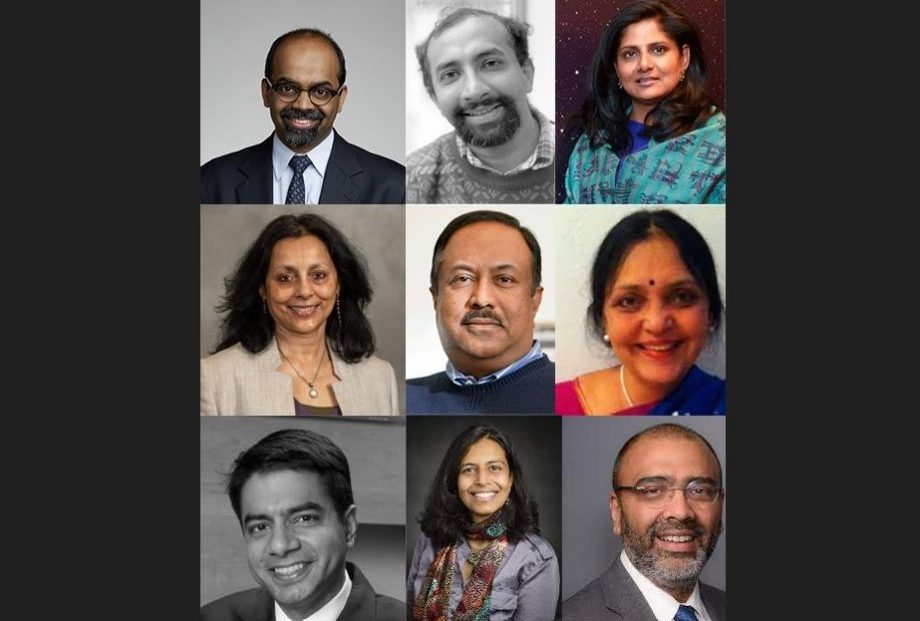9 Indian Americans elected to American Academy of Arts and Sciences

 The Academy is honoring excellence, innovation, and leadership and recognizing a broad array of stellar accomplishments
The Academy is honoring excellence, innovation, and leadership and recognizing a broad array of stellar accomplishments
Nine Indian Americans are among 270 new members elected in 2023 to the American Academy of Arts and Sciences which has been honoring excellence since its founding in 1780.
“With the election of these members, the Academy is honoring excellence, innovation, and leadership and recognizing a broad array of stellar accomplishments,” said Academy President David W. Oxtoby announcing this year’s new members.
Read: Four Indian Americans selected new members of the American Academy of Arts and Sciences (May 13, 2015)
“We hope every new member celebrates this achievement and joins our work advancing the common good.”
The 270 members elected in 2023 are drawn from academia, the arts, industry, policy, research, and science, and include more than 40 International Honorary Members (IHM) from 23 countries.
Nine Indian Americans elected in 2023 are: Lakshminarayanan Mahadevan, Harvard University (Mathematics, Applied Mathematics, and Statistics); Vidya Madhavan, University of Illinois Urbana-Champaign, and Senthil Todadri, Massachusetts Institute of Technology (Physics), Priyamvada Natarajan, Yale University (Astronomy, Astrophysics, and Earth Sciences); Ruma Banerjee, University of Michigan (Biochemistry, Biophysics, and Molecular Biology); Sankar Ghosh, Columbia University (Microbiology and Immunology); Vasudha Narayanan, University of Florida (Religious Studies); Amitabh Chandra, Harvard Kennedy School (Public Affairs and Public Policy); and, Sudip Parikh, American Association for the Advancement of Science (Scientific, Cultural, and Nonprofit Leadership).
Read: Six Indian Americans win 2023 Guggenheim Fellowships (April 10, 2023)
Lakshminarayanan Mahadevan is a Professor of Physics, de Valpine Professor of Applied Mathematics, and Professor of Organismic and Evolutionary Biology at Harvard University.
Mahadevan graduated from the Indian Institute of Technology, Madras, and then received an MS from the University of Texas at Austin, and an MS and PhD from Stanford University in 1995.
After completing his doctoral studies, Mahadevan held postdoctoral positions at the University of Chicago and the University of California, Santa Barbara, before joining the faculty at the Massachusetts Institute of Technology in 1996. He moved to Harvard University in 2003.
Vidya Madhavan is a Professor of Physics at University of Illinois Urbana-Champaign. She received her bachelor’s degree in metallurgical engineering in 1991 from the Indian Institute of Technology, Chennai, and a master of technology degree in solid state materials in 1993 from the Indian Institute of Technology, New Delhi.
She obtained her PhD from Boston University in 2000. She held a postdoctoral appointment at the University of California, Berkeley from 1999 to 2002, before joining the physics faculty at Boston College in 2002.
She joined the faculty at Illinois in 2014 as a full professor. Her research interests include investigating fundamental problems in quantum materials where interactions between the spin, charge, and structural degrees of freedom lead to emergent phenomena.
Senthil Todadri is Professor of Physics, Massachusetts Institute of Technology. He received his undergraduate degree from the Indian Institute of Technology, Kanpur in 1992, and his PhD from Yale University in 1997.
He then moved to a postdoctoral position at the Kavli Institute of Theoretical Physics in UC Santa Barbara before joining the physics faculty at MIT in 2001.
His interests span a wide range of theoretical quantum condensed matter physics. His research seeks to develop a theoretical framework for describing the physics of novel quantum many particle systems by combining phenomenological modeling of experiments with abstract theoretical ideas and methods.
Priyamvada Natarajan is a Professor in the departments of astronomy and physics at Yale University. She is noted for her work in mapping dark matter and dark energy, particularly with her work in gravitational lensing, and in models describing the assembly and accretion histories of supermassive black holes.
She is the author of “Mapping the Heavens: The Radical Scientific Ideas That Reveal the Cosmos.” Natarajan has degrees in physics and mathematics from MIT.
She was also enrolled in the MI. Program in Science, Technology & Society and the MIT Program in Technology and Public Policy from 1991 to 1993.
She did her graduate work in theoretical astrophysics at the Institute of Astronomy, University of Cambridge, England, receiving a PhD degree in 1998.
Ruma Banerjee is Vincent Massey Collegiate Professor of Biological Chemistry at the University of Michigan Medical School. She is an experimentalist whose research has focused on unusual cofactors in enzymology.
Since 2012, Banerjee has been an Associate Editor for Chemical Reviews and the Journal of Biological Chemistry. She has authored two textbooks on the chemistry and biological effects of Vitamin B12 and on reduction / oxidation cascades in biological systems.
Sankar Ghosh is an immunologist and molecular biologist who is currently the Silverstein and Hutt Family Professor of Microbiology and Immunology at Columbia University.
Ghosh is best known for his pioneering research on the activation of cellular responses via NF-κB, a transcription factor that plays a critical role in regulating the expression of a large number of genes involved in the mammalian immune system.
He completed his undergraduate studies in chemistry at the University of Calcutta. Ghosh received his Ph.D. in Molecular Biology from the Albert Einstein College of Medicine in 1988.
He then did his postdoctoral research training with Nobel Laureate Dr. David Baltimore at the Whitehead Institute at MIT in Cambridge, MA. Ghosh previously received his BSc and MSc degrees from Calcutta University in India.
Vasudha Narayanan is a distinguished professor of religion and the director of the Center for the Study of Hindu Traditions at the University of Florida.
She is a scholar of Hinduism and studies the intersection of religion and culture in South Asia. Narayanan earned her undergraduate and graduate studies in religion at the University of Madras.
She later earned her PhD in religious studies from Harvard University. She has published numerous books and articles on Hinduism and the religious traditions of South Asia.
Her work focuses on the diversity of religious practices and beliefs within Hinduism, as well as how religion intersects with politics, gender, and culture in South Asia.
Amitabh Chandra is an Indian-American academic and healthcare economist who is the Malcolm Wiener Professor of Social Policy at the John F. Kennedy School of Government at Harvard University.
Chandra received his BA and PhD in economics from the University of Kentucky. Chandra is a member of the Congressional Budget Office’s (CBO) Panel of Health Advisors, and is a Research Associate at the National Bureau of Economic Research (NBER).
His research focuses on innovation and pricing in the biopharmaceutical industry, value in health care, medical malpractice, and racial disparities in healthcare.
He is particularly interested in reducing the barriers to discovering new methods for the primary, secondary, and tertiary prevention of Alzheimers disease.
Read: 9 Indian Americans Elected New Members of the American Academy of Arts and Sciences (May 4, 2023)
Sudip Parikh is the Chief Executive Officer of the American Association for the Advancement of Science (AAAS), the world’s largest general scientific society.
Before that, he was senior vice president and managing director at DIA Global, a neutral, multidisciplinary organization bringing together regulators, industry, academia, patients, and other stakeholders interested in healthcare product development.
The son of Indian immigrants who worked in the textile and furniture manufacturing plants of North Carolina, Parikh completed undergraduate studies at the University of North Carolina at Chapel Hill, first as a journalism major before switching into materials science.
